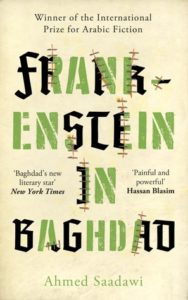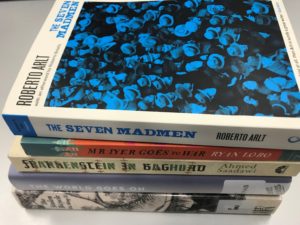My Thoughts and Reading in September 2018
 For the past few months it has felt like I have really slowed down in my reading, and that felt a little demoralising. Granted, to use the world ‘demoralising’ when referring to one’s reading life is very much a first world problem. To think my biggest problems in my life is about my reading journey really does mean that I have a pretty great life. I am currently in a period of uncertainty with my job where I am unsure if I will be made redundant and yet my concern is directed towards how many books I have read in a single month. As much as I would love to keep my current job, I feel at ease around the whole situation, one path leaves me with work, the other leads to a pay out and more reading time. While I do experience a little worry, it only comes in short waves and honestly I feel like they would be stupid to get rid of me.
For the past few months it has felt like I have really slowed down in my reading, and that felt a little demoralising. Granted, to use the world ‘demoralising’ when referring to one’s reading life is very much a first world problem. To think my biggest problems in my life is about my reading journey really does mean that I have a pretty great life. I am currently in a period of uncertainty with my job where I am unsure if I will be made redundant and yet my concern is directed towards how many books I have read in a single month. As much as I would love to keep my current job, I feel at ease around the whole situation, one path leaves me with work, the other leads to a pay out and more reading time. While I do experience a little worry, it only comes in short waves and honestly I feel like they would be stupid to get rid of me.
Getting back to my reading month, I started off by finishing The Shape of the Ruins. I had put this one aside for the entire month of August because it was Women in Translations Month. Which makes me feel like I have done this book a disservice. Setting down a book normally is caused by not enjoying what I am reading but in this case I was literally distracted by other books. I am more interested in being a part of this great reading event. Juan Gabriel Vásquez is an amazing writer and I feel like my recent discovery of his books is one of the highlights of the year, but when women in translation month came along I could not stop myself from focusing on that event. Do you ever get that feeling? Sometimes I want to go into the new month with a clean slate but there will always be other books to distract my reading journey. I have found my reading niche, and I am happy that my focus is solely on translations, probably because I am now being distracted by less books than before.
One of the highlights of September was a weekend away from everything. My wife had to go down to Brisbane for work, and I decided to come along for the ride. I had a few days in a hotel room with some books I wanted to read. This was an amazing experience. I took down Aracoeli, Fever and Spear and Wait, Blink to occupy my time. There is something refreshing about stepping away from the distractions of your life to focus on some reading. I think this reignited the passion within me and kicked my reading back into normal gear. I was not experiencing a reading slump but I think I was lacking the motivation to read as frequently as I normally do. As far as the three books are concerned, Fever and Spear was the clear highlight. I think I am not smart enough to fully appreciate Aracoeli, but I will get there and Wait, Blink was just a fun quirky read.
The National Book Award in America last year announced that they had added a translated literature award and this month we finally got to see what was on their first longlist. My initial reaction to the list was one of curiosity, mainly because I was unfamiliar with half the picks. There were some obvious choices like Flights which won the Man Booker International prize this year. However The Beekeeper is an interesting pick, mainly because it is the only non-fiction book to make the list. I do feel like I should read the entire longlist just to be a part of the conversation. I listen to a podcast called The Three Percent Podcast which focuses mainly on translations and the publishing world, and just listening to the way they talk so critically about this longlist makes me envious. I know I have only recently focused on reading translations but I hope to be able to get to a point in my life where I can just scoff at a longlist the same way as the hosts. This kind of reaction happens all the time when an award like the Man Booker International longlist is announced. I feel like that kind of familiarity towards the choices is definitely a reading goal for me. Out of the ten books picked, I had only read one of the books picked (Flights), but at the end of this month I have completed three more (Wait, Blink, Love and Trick). Two others are currently being read (Comemadre and Disoriental). Which is leaving me in a really good position to complete the rest of the list, which are Aetherial Worlds, The Beekeeper, One Part Woman and The Emissary. Expect to see reviews from all these books in the next few months.
I finished off the month reading African Psycho, which is obviously a parody on American Psycho but I think I enjoyed it more. Not because there was anything special about the novel, mainly because it was a very different book to what I expected. Half the book I felt was a struggle, and that seemed to be the author emulating that obsession found in American Psycho, but the ending really pulled the whole book together. Finally I ended the month on a low note, The Silence of the Girls, which was the book club pick for October. It was a boring retelling of the Trojan War told from the perspective of a female slave. There was so much potential in exploring the fears this woman might have faced but Pat Barker missed the opportunity. This was told from the first person perspective of the slave so we could hear her thoughts, but for the most part the author wrote lines like “I was scared” regarding a situating with nothing more. You know that old writing advice “show don’t tell”? Pat Barker should have listened to that advice. Just writing about this is making me angry and I have said more about this novel than the others because this will be the last time I put any effort into writing about The Silence of the Girls.
I mentioned that I am currently reading Comemadre and Disoriental. I also mentioned that I want to complete the National Book Awards longlist for translated literature, so I do need to mention that again. I have been feeling very motivated and I hope to take that opportunity to write more. I still have a few reviews to write but I also want to get back into BookTube. I love talking about literature and looking for as many ways to do so as possible. Have you seen The Literary Discord? For those who do not know, Discord is like a modern day forum, it was created mainly for games as a place to build communities, but other communities have utilised it as well, including me when I created The Literary Discord as another place to talk about literature. My plan to return to BookTube is to push myself to speak about books that do not get enough attention (translations). It is a way to practise speaking and develop my voice. I have this blog and my podcast that I am passionate about, I hope to be able to bring that same passion back to BookTube, because I lost it. I hope this new found energy continues for me and I hope you have all had a great reading month.

 Title: Like a Fading Shadow (
Title: Like a Fading Shadow ( Title: Vernon Subutex, 1 (
Title: Vernon Subutex, 1 ( Title: Frankenstein in Baghdad (
Title: Frankenstein in Baghdad ( Title: The Stolen Bicycle (
Title: The Stolen Bicycle ( I live in a city that often does not get much rain. So when we get two weeks of constant rain it is a rare treat. There is nothing better than curling up in bed with a cup of tea and a good book, while thunder and lightning is raging outside. I was able to spend those two glorious weeks reading Frankenstein in Baghdad. Most people know about my obsession with Frankenstein, the book that literally changed my life. Normally I am apprehensive about any take on this classic novel but Ahmed Saadawi was able to deliver something sensational. His take on the classic was able to compare the tale with post-invasion Iraq in a unique way. Since it has been two hundred years since Mary Shelley’s novel, I cannot help but think about revisiting the book once again. Oxford World Classics did send me a beautiful hardback edition, so a reread is in my very near future.
I live in a city that often does not get much rain. So when we get two weeks of constant rain it is a rare treat. There is nothing better than curling up in bed with a cup of tea and a good book, while thunder and lightning is raging outside. I was able to spend those two glorious weeks reading Frankenstein in Baghdad. Most people know about my obsession with Frankenstein, the book that literally changed my life. Normally I am apprehensive about any take on this classic novel but Ahmed Saadawi was able to deliver something sensational. His take on the classic was able to compare the tale with post-invasion Iraq in a unique way. Since it has been two hundred years since Mary Shelley’s novel, I cannot help but think about revisiting the book once again. Oxford World Classics did send me a beautiful hardback edition, so a reread is in my very near future.